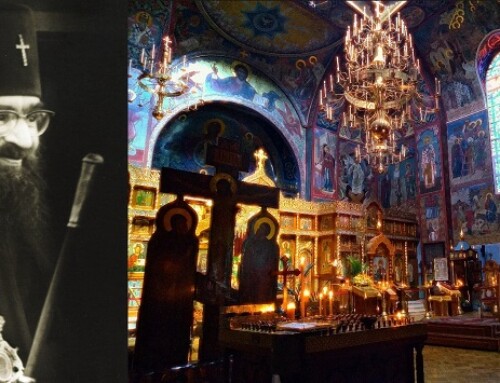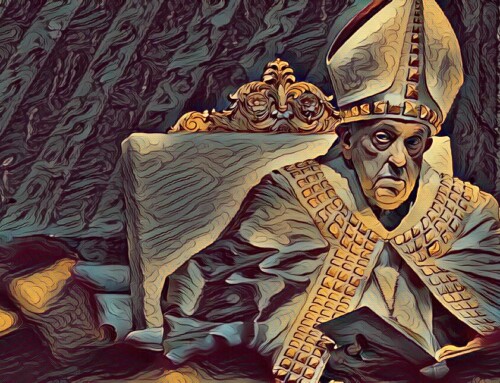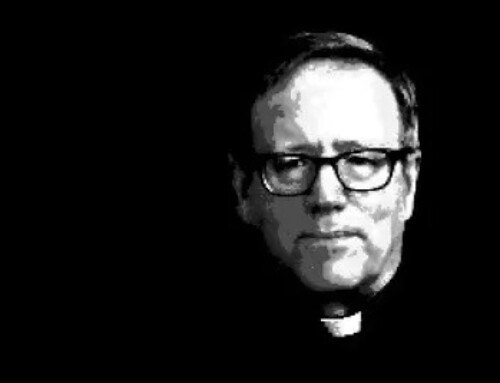“In those situations where homosexual unions have been legally recognized or have been given the legal status and rights belonging to marriage, clear and emphatic opposition is a duty. One must refrain from any kind of formal cooperation in the enactment or application of such gravely unjust laws and, as far as possible, from material cooperation on the level of their application. In this area, everyone can exercise the right to conscientious objection.” ~ Congregation for the Doctrine of the Faith, “Considerations Regarding Proposals to Give Legal Recognition to Unions between Homosexual Persons.”
After over a decade in the gay lifestyle, nothing seemed to confirm someone in the homosexual orientation more than the willingness of family members and friends to celebrate or even silently cooperate with a decision to “come-out” or to openly live as a gay man or woman. In my experience, I saw both extremes: young men who fled to the accepting bastion of San Francisco from homes that were sadistically and sometimes violently anti-gay to guys with parents who gave them and their partners a wedding shower. My own relations with my family was a bit more ambiguous: from what my parents could figure out, they didn’t like what I was doing, but were often at a loss as what to do -so, they didn’t say much, but when they did – I clearly understood that they were heavy-hearted, concerned, and even afraid for me.
When recalling the coming-out experience, every gay man or women, in the retelling, always paid special attention to how their parents reacted. Again, there are strong variations: from kisses, hugs, accompanied by shouts of “I am so proud of you” to sobbing while barely getting out the words: “How could you do this to me?” Gay men most keenly recounted what their father did and said, or didn’t say; and the women did the same with regards to their mothers. Since the male homosexual wound originates in the childhood relationship between father and son, how the father accepts or denies his son becomes all important.* For the most part, fathers had a much harder time dealing with their son’s homosexuality than the mother: hence, an uneasy stand-off typically ensued; usually this became apparent when my non-native California friends had their moms visit them in San Francisco and their dads staid back at home. Conversely, it was not unexpected for, at some point, the semi-rejected to rise up and deliver an ultimatum, especially after coupling-up and wanting everyone to meet their new partner; it usually went something like this: “Either you accept me and my boyfriend or you will never see me again.” Oftentimes, the response would determine the fates of their children. Only, over and over again – I saw even the most stalwart father cave under to such pressure – so, a hushed stand-off was instituted.
In the 1990s, gay weddings were neither legal nor recognized by most churches; as a result, such ceremonies were usually back-yard or beach affairs presided over by a fringe minister. I went to a few. Once, I remember seeing the parents of one of the guys and thinking that they looked sort of dazed through their intermittently forced smiles. But, my friend was happy and that’s all I cared about at the moment. The next time I would see the two of them was after their son’s death; back then, I don’t think they knew that he was HIV+ when he got “married.” After the funeral, they appeared more at ease and much calmer than I remembered them from years before – I guess, at least for them, it was finally over.
Another vivid memory, a boy from the South, an only child, who got to San Francisco during the same fateful year as I did: he invited me to lunch with himself and his visiting mother. She was loud and completely over the top, but I loved her. He was kind of the gay male version of her. They were more like best friends than mother and son. Their love for each was apparent and their enthusiasm was inescapable. But, even I was repulsed when my friend started talking about his sex life with his mom; albeit not in a gross or explicit way; nevertheless, she offered her various appraisals. Later, I questioned him about it: he assured me that their relationship had always been exceedingly honest. Not long after we first met, I asked about his father: the man said he no longer had a son. His reality was far from my own understanding.
An exceedingly painful recollection was of a tragic friend who made the trek from the East Coast to California with big dreams and even bigger baggage from his childhood: his abusive father had since passed away, but his mother lived in a constant state of prayerful denial – submerging her sorrows in religion while her son suffered in silence. When I met him, I was immediately attracted, but his insatiable drive for love and male affirmation rather quickly made me feel uneasy and unable to accommodate his fits of loneliness and unfathomable depression. For his family, he semi-existed as a partially living shadow figure. Because he felt rejection so deeply, the gay world became his universe; there was nothing else. Thus, when that inevitably began to fail him – he understandably panicked and finally succeeded in overdosing the pain away.
Curiously, in hindsight, my own parents occupied an odd middle ground: they never once approved of what I was doing, but they always opened the door to me, but, not to my lifestyle and not to my friends. As long as I live – I will never forget a pivotal moment that would forever change my life: at a time when my daily world was getting really sadist and perverse, I showed up at my parent’s home with two buddies. While I looked passably normal in all black with my head completely shaved, my compatriots looked like extras from a gay version of “The Road Warrior.” Visibly uncomfortable, my father tolerated our presence. While we were leaving, my dad pulled me aside, he was totally present, stout-hearted and utterly composed – he said: “Don’t ever come here with these people again.” I told him – I wouldn’t, but I also said that if they weren’t welcome then I wasn’t welcome either. For awhile, I staid away.
In 1999, after over 10 years in the gay lifestyle, I finally couldn’t take it anymore. The hopes and fantasies that took me to the Castro were buried in the same graves that my friends got thrown in to. I spent most of my life looking for my Father – only to realize that He was waiting at home for me; like the willful Prodigal Son I never thought that my choices would eventually leave me eating with the pigs. But, unlike my friends, when things got that dark – I had a place to go. Because my parents had remained stalwart, I knew that they would take me in, but also that they would not see me go back to that hell I just left.
Too many times, I saw friends stay put in the lifestyle and die because they had nowhere else to turn. For the most part, their families never would have understood because they either thought their son or daughter was unquestionably happy and perhaps hitting a passing area of rough seas or that they were already too far gone. Both extremes lock the orientation: acquiescence and passivity mark agreement and the self-acceptance of being gay becomes increasingly comfortable; total rejection, without the guarantee of an open door for the desperate, equally condemns the lost to seek out a permanent home elsewhere. Somewhere, the two must meet within the family: a complete denial of the person’s gayness while upholding their indelible worth as children of God.
For the most part, when I recognized that I, or any of my gay friends, were really struggling to comprehend what went so drastically wrong in our lives: outside or straight friends were a non-equation. That was partially my fault, for the lack of blood-ties created a watered down connection that solely relied upon everyone’s full acknowledgment of the inherent “gayness” of the other; if there were ever any questions of loyalty, one could cut loose a friend with more ease than you would say good-bye to a parent or sibling. Generally, we were more willing to keep some ties with family members that we perceived as haters than with non-relatives. Still, the gay world was largely an echo-chamber of our own making. When things got tough, it was just tough and you thoughtlessly plodded ahead; often repeatedly, not knowing where you were headed or why. In this hopeless ocean of despair, there were no lighthouses to guide our way.
In every gay man and woman’s life – there should be at least one lighthouse of strength and sanity. What do I mean? For the most part, gays are surrounded, especially in their own communities, by people who unquestionably accept their homosexuality and accept their decisions. Increasingly, only a few refuse to go along; and, they are quickly singled out as intolerant small-minded bigots. For instance: Whether or not the gay person, and their partner, receives an invitation to Christmas or Thanksgiving dinner is frequently a litmus test; in their mind – it comes down to this: Do you or do you not love me? If someone passes, they are required to further prove their allegiance: Will you be at my wedding? At some point – this needs to stop.
It is my contention that almost all gay men and women at some point reach a crisis stage; I did at about age 20 when my first serious lover matter-of-factly got tired of me and coldly left; suddenly, I was questioning everything; I wanted someone to talk to. I knew I would get nowhere with my friends as they would have simply taken me out for a drink and proceeded to verbally trash my ex in an effort to make me feel better. So, I turned to someone outside of the life who I trusted. Then, I was surprised when he told me that everything was fine and that I needed to hang in there and that things would eventually get better. I did. But, they didn’t.
To those who remain faithful and outside the ring of open collaboration and weak submission which surrounds nearly every gay person- you will be the one hold-out who refuses to take part; you will be obvious and you will be remembered by the gay man or woman you seemingly discarded. But, this memory will someday prove a precious gift. For, you took the time to reach out to your gay son, daughter, brother, sister, cousin or friend and calmly explain to them the reason for you absence at the big moments in life. They will probably think of you are hopelessly outdated, homophobic, or a victim of religious zealotry. But, they will remember you. Over the years, you continue to send them Christmas Cards and remembrances of their birthdays; you have Masses said for them, you pray, and you fast in their honor. Unexpectedly, seemingly out of nowhere, you get a call or an e-mail – its your long lost gay son or daughter. They need you help.
If you had succumbed to the pressure, if you attended their gay wedding – your light would have been extinguished and you would have joined the chorus of revelers and appeasers who are good for the party, but rarely volunteer to clean up the mess after everyone goes home. For that reason, remain strong: if you must, be the one who always stands outside the throng of well-wishers; be the one who is willing to speak the Truth, with patience and charity, but who is also willing to suffer banishment when the Truth is unwanted. Because, when all my so-called friends dumped me – the only people to take me in were my parents, particularly my father: who once told me the ugly and unpleasant reality of what I was doing. In the end, his bravery made it possible for me to live – and to hope for something outside of who I though I was.
Therefore, since we have this ministry through the mercy shown us, we are not discouraged. Rather, we have renounced shameful, hidden things; not acting deceitfully or falsifying the word of God, but by the open declaration of the truth we commend ourselves to everyone’s conscience in the sight of God. And even though our gospel is veiled, it is veiled for those who are perishing, in whose case the god of this age has blinded the minds of the unbelievers, so that they may not see the light of the gospel of the glory of Christ, who is the image of God. For we do not preach ourselves but Jesus Christ as Lord, and ourselves as your slaves for the sake of Jesus. For God who said, “Let light shine out of darkness,” has shone in our hearts to bring to light the knowledge of the glory of God on the face of [Jesus] Christ. (2 COR 4:1-6)
Author’s note: A personal point of concern is if Courage members or those attempting to leave the gay lifestyle feel that it’s suddenly okay for them to attend a gay wedding. When I got thrown out of the homosexual world – I staid completely away from it for many years. Those friends I once knew, when they called, I was polite, but usually curt – telling them that I had moved on. For the most part, San Francisco was off limits; and, its not that I was afraid, but that I instinctively knew I needed time to heal; I just wanted to hide in the wounds of Christ and rest there for as long as I could. Then, I couldn’t imagine socializing with old associates from the gay scene; let alone, attending a same-sex wedding. If I had, I think I could have been easily lost. Because, that time of healing was also an intimate time of purging: of Christ keeping me oftentimes completely alone with Him. As a result, I occasionally became lonely and depressed. Therefore, if, at that vulnerable moment, I would have gone to a gay wedding and witnessed the celebrations and the seemingly happy pair of grooms, made even more dramatic by the approval of parents and family who are in attendance, I could have very possibly said to myself: “Why should I even attempt chastity and recovery; after all – I deserve happiness too.” Because, during those instant flashes of distraction we can easily forget everything, including the needless deaths of so many that we loved and lost, and almost manually reopen those old wounds – thinking beyond reason that the world holds the secret to our ultimate restoration: it doesn’t. Next, all we can do is turn away and pray for those we regrettably leave behind.
*“Children who have involved fathers have less difficulty in formulating their sexual identity than children whose fathers are less involved (Biller & Kimpton, 1997; Rekers, 1982) and men who identified themselves as heterosexuals are more likely to describe their relationship with their father in positive terms than homosexual men (Floyd, 2001; Floyd, Sargent, & Di Corcia, 2004). Involved fathers influence the social functioning and relationships of their children (Beatty & Dobos, 1993; Biller & Kimpton, 1997; Franz et al., 1991) by facilitating the development of increased prosocial behavior, such as working and engaging in loving relationships; increased social acceptance (Snarey, 1993); and decreased delinquency (Pleck & Masciadrelli, 2004). Father involvement is also associated with adult sons’ increased marital (Franz et al., 1991) and life satisfaction (Pleck & Masciadrelli, 2004).” Article: “Father Closeness: Its Effect on Married Men’s Sexual Behaviors, Marital, and Family Satisfaction,” Ryan Hosley, Ken Canfield, Susan L. O’Donnell, Gale Roid, Sexual Addiction & Compulsivity 03/2008; 15(1):59-76.






awesome! bless you – thank you for your knowledge, wisdom and the Bible verse!
Thank you for sharing your heart. God bless you with courage and strength as you proclaim the Good News–Jesus saves!
God bless you for your good advice and wisdom.
Your advise gives me strength. My son is in a SSA relationship and my husband and I have not budged in our biblical based beliefs that what he is doing is wrong. He has threatened to sever the relationship and sometimes we don”t hear from him for awhile, but he always comes back. It deeply troubles him that we won't condone his behavior. I pray that his Catholic upbringing and our continuous prayers will allow for the conversion of his soul. God Bless you Joseph!